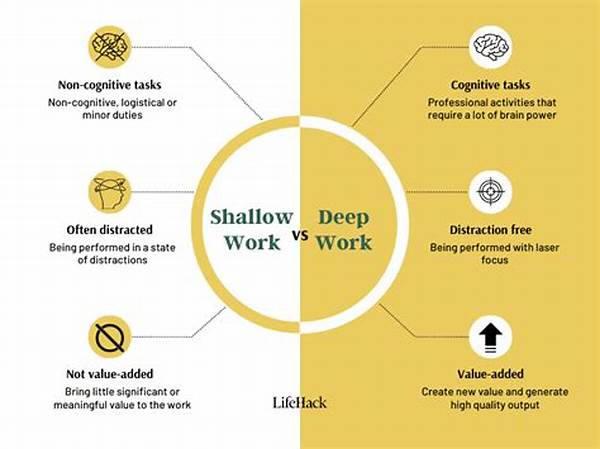- Deep Work vs Shallow Work: Which One Drives Results
- Why Prioritizing Deep Work Matters
- Introduction: Deep Work vs Shallow Work
- Deep Dive Into the Mechanics
- Exploring Deep Work vs Shallow Work: Which One Drives Results
- 10 Goals Related to Deep Work vs Shallow Work: Which One Drives Results
- Discussing Deep vs Shallow Work: A Transformative Approach
- Building Strategies for Maximizing Results
- Implementing Deep Work into Your Routine
- 5 Tips for Deep Work vs Shallow Work: Which One Drives Results
- Delving into Deep Work vs Shallow Work: Which One Drives Results
Deep Work vs Shallow Work: Which One Drives Results
In the hustle and bustle of modern productivity, we’re continually bombarded with tasks, responsibilities, and deadlines. But what if I told you that the key to truly exceptional work lies not in the volume of work, but in its nature? Enter the world of deep work vs shallow work. These terms, popularized by Cal Newport, refer to two very different approaches to task management and productivity.
Read More : The Ultimate Habit Stack: Pairing Meditation With Deep Work For Unstoppable Focus!
Deep work is the process of focusing without distraction on a cognitively demanding task. It’s like diving deep into an ocean of potential where creativity and innovation await. On the flip side, shallow work consists of non-cognitively demanding, logistical-style tasks, often performed while distracted. Much like skimming surf on a calm beach, it’s necessary but doesn’t engage our full potential.
Analyzing deep work vs shallow work: which one drives results can lead to profound realizations about how we spend our time. Deep work is difficult to execute but offers substantial rewards, such as creating new knowledge, solving complex problems, and boosting performance. In contrast, shallow work hurts innovation but fills our time and makes us feel busy.
In an era where being “busy” is often seen as a badge of honor, it’s crucial to reconsider what truly constitutes effective work. By consciously choosing deep work when necessary, we can orchestrate our schedules and tasks in a way that maximizes results and contributes to meaningful progress.
Why Prioritizing Deep Work Matters
The importance of choosing deep work over shallow work lies in its ability to spur growth and yield tangible, high-value results. In contrast to shallow work that might make you feel momentarily productive, it’s the focused, uninterrupted engagement with tasks that truly drives your projects forward and fosters creativity.
—
Introduction: Deep Work vs Shallow Work
In today’s fast-paced world, productivity has become the golden word, with everyone searching for the magic formula that can enhance their output. Theories abound, but one particular discussion has gained traction among professionals: deep work vs shallow work. These concepts dissect the nature of our daily tasks and offer insight into where we can derive the most value.
Deep work is defined by its demand for intense focus and cognitive engagement. When you’re in the zone, tackling a challenging task without distractions, you’re engaging in deep work. It’s the kind of effort that can lead to breakthroughs, innovative ideas, and a sense of accomplishment.
Contrastingly, shallow work isn’t meaningless—completing emails, attending meetings, and handling administrative duties are necessary. However, over-prioritizing these tasks can result in a routine that’s busy but not necessarily productive. Stopping to assess the balance of deep work vs shallow work helps in determining which approach will drive better results for you.
Understanding deep work vs shallow work, which one drives results, is critical in carving out time for depth in a world obsessed with immediate outcomes. By training our brains to dive deep, we can reap long-term benefits in our careers and personal lives. Imagine spending dedicated hours without distraction on a project and the immense satisfaction that follows the completion of such focused endeavors.
To make the most of your potential, recognize the difference between these styles of work and apply this understanding in your daily routine to transform outcomes. Allocate specific times for deep work, guarding this time fiercely against interruptions, and you’ll quickly see which approach truly drives results in your life.
Deep Dive Into the Mechanics
Understanding the mechanics of deep work involves recognizing not just the need for depth but also the ways to create an environment conducive to this state. It’s about more than just willpower; it’s embedding deep work into your company’s culture and your daily schedule.
Exploring Deep Work vs Shallow Work: Which One Drives Results
When comparing deep work vs shallow work, which one drives results, it’s vital to examine tangible examples. Do successful entrepreneurs spend their days caught up in emails, or do they dedicate time to develop visionary projects? This nature of allocation is what separates true productivity from mere busywork.
—
10 Goals Related to Deep Work vs Shallow Work: Which One Drives Results
—
Discussing Deep vs Shallow Work: A Transformative Approach
When contemplating deep work vs shallow work, which one drives results, it’s essential to recognize how it transforms the work you perform. Shallow work touches on the logistical sides of our lives; it’s like the connective tissue holding everything together but not the main muscle that fuels our success. Meanwhile, deep work accelerates growth, driving our professional and personal aspirations forward.
Delving into deep work allows for extended periods of undisturbed concentration, essential for engaging in learning, problem-solving, and innovation. This focus breeds efficiency, meaning you accomplish more in less time and with higher quality. As Albert Einstein famously said, “It’s not that I’m so smart, it’s just that I stay with problems longer.” That’s deep work at its finest.
In contrast, shallow work might give the illusion of productivity since so many tasks are processed, but it’s an exhausting cycle with little reward. Finding time for deep work amidst our digital distractions can feel like an uphill battle, yet the benefits it offers are unparalleled. By consciously opting for deeper work patterns, we steer our careers and personal lives towards greater achievements.
Building Strategies for Maximizing Results
One effective strategy to leverage deep work successfully is to adopt a systematic approach. Setting clear goals and time blocks dedicated to deep work ensures you remain intentional about your priorities. Think of it like scheduling a meeting with yourself, one that’s non-negotiable and paramount for the success of your projects.
Implementing Deep Work into Your Routine
Bringing deep work into daily life involves more than decision-making; it’s about restructuring habits and establishing routines prompting full immersion. Start small—a few hours of deep focus per week—and gradually build from there. Ensure the necessary conditions, such as silence and limited digital interference, to fortify these changes. By practicing this transition, you will see both qualitative and quantitative improvements in your work.
—
5 Tips for Deep Work vs Shallow Work: Which One Drives Results
1. Schedule Deep Work: Allocate uninterrupted time slots daily or weekly for deep focus.
2. Create Boundaries: Implement “do not disturb” periods to minimize distractions.
3. Set Clear Objectives: Define what success looks like for each deep work session.
4. Limit Shallow Work: Analyze your calendar to identify tasks that can be delegated.
5. Monitor Progress: Track time spent in deep work and its effects on productivity.
—
Delving into Deep Work vs Shallow Work: Which One Drives Results
Dedicating the effort to dissect deep work vs shallow work offers insight not only into productivity but also into how we create value in our lives. In the realm of professional success, making room for deep work pays dividends that transcend fleeting tasks. It catalyzes sustainable growth, yielding solutions that shape careers and companies.
Deep work is akin to an invested approach where the returns compound over time. Shallow work might maintain the status quo, but diving into deep work transforms possibilities. Consider someone trying to learn a new instrument: deep practice could lead to stunning performances, while sporadic engagement barely scratches the surface.
Narratives from executives and thought leaders emphasize the necessity of chasing depth to remain competitive in today’s landscape. Embracing deep work isn’t merely a personal choice—it’s a professional necessity that aligns task engagement with strategic objectives.
Listening to testimonials from individuals who embraced deep work, they recount improved skills, satisfaction in meaningful accomplishments, and a balanced sense of self. The benefits ripple across all aspects of life, transforming not only the quality of work but its essence, providing clarity and purpose.
When choosing between deep work vs shallow work, which one drives results becomes a pivotal question. By delving into deep work, we uncover not just answers but innovations that shape the future of industries and personal legacies.


